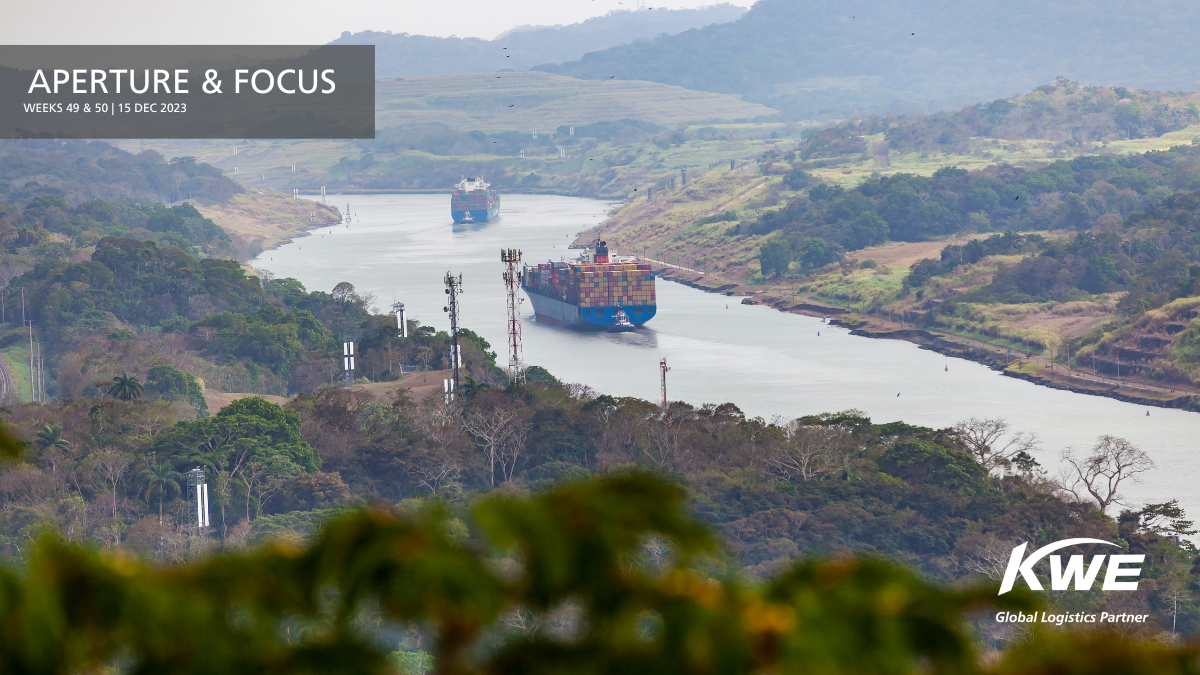Quote
Aperture & Focus 2023: Week 49 & 50

Global Aperture
As draught-driven restrictions at the Panama Canal continue to impact trade, U.S. container imports declined by 9% month-over month in November 2023, with the port of Houston in particular experiencing a decline of 26.7%.Top of Form Due to a loss of confidence in the Panama Canal, multiple carriers are diverting Asia-North America east coast sailings to Suez and Indian Ocean routes. The recent attacks on commercial shipping off the coast of Yemen by Houthi rebels have further deterred vessels from transiting the Suez Canal, potentially leading to a significant downturn in traffic through both the Suez and Panama canals, with an increase in vessels preferring passage past the Cape of Good Hope.
On December 9, Yemen's Houthi movement announced their intention to target all ships bound for Israel, irrespective of nationality, escalating tensions in the region amid the conflict between Israel and Hamas. The Houthis, aligned with Iran, have seized Israeli-linked ships in strategic waterways like the Red Sea and the Bab al-Mandab strait, warning international shipping companies against dealing with Israeli ports and stating their actions are in support of the Palestinians. As a result of the escalating tension, Maersk has become the latest among major carriers that include Zim and Hapag-Lloyd to begin implementing emergency risk surcharges (ERS) at Israeli ports due to increased insurance premiums. The surcharge will apply to Israeli import cargo for bookings from January 8, and while Maersk removes special measures supporting Israeli shippers due to operational stability, it remains prepared to reassess customer support packages in case of changing circumstances in Israel.
Regional Focus
Americas
USA: Following its inaugural meeting on November 27, the White House Council on Supply Chain Resilience announced a number of measures to address challenges and strengthen the supply chain. The initiatives include the establishment of a Multimodal Freight Office, a Supply Chain Resilience Center, and steps to secure critical supplies, medicines, and investments in domestic manufacturing, with a focus on collaboration, data-sharing, and risk assessment.
Canada: On December 1, Transport Canada launched its new National Supply Chain Office, aimed at strengthening Canada's supply chains and enhancing the economy's competitiveness. With an investment of 27.2 million Canadian dollars from Canada's Budget 2023, the office will develop and implement a National Supply Chain Strategy, respond to significant disruptions, support data sharing for more efficient goods movement, and provide leadership and coordination for interprovincial/territorial and global supply chain issues.
Asia-Pacific
India: Cyclone Michaung, which lashed the country last week, has severely disrupted container flow in and out of southern Indian ports, including Chennai, Kattupalli, and Ennore, causing three days of halted operations. The adverse weather, including torrential rains and flooding, impacted export/import cargo flows, leading to minimal activity, berthing delays, and challenges in accessing inland areas, with carriers like Maersk and CMA CGM reporting delays and service disruptions.
Singapore: The Maritime and Port Authority of Singapore (MPA) has formalized plans for a transpacific green and digital shipping corridor with the Port of Long Beach and Port of Los Angeles to accelerate zero-emission shipping. The Partnership Strategy, supported by C40 Cities, aims to collaborate with fuel and maritime stakeholders to coordinate decarbonization efforts, establish green shipping best practices, and leverage networks to achieve net-zero greenhouse gas emissions.
Europe, Middle East & Africa
As a reminder, beginning January 2024, the European Union's Emissions Trading System (EU ETS) will be extended to encompass CO2 emissions from every large vessel (with a gross tonnage of 5,000 and above) entering EU ports. The new rules aim to address 50% of emissions from journeys originating or concluding outside the EU, with the third country determining appropriate measures for the remaining emissions, and 100% of emissions during trips between two EU ports and while vessels are within EU ports.
Belgium: Major strikes across Flemish waterways, involving marine pilots and public service workers, disrupted operations at Antwerp, Europe's second-largest container port, on December 7. The industrial action, a response to reforms to the Flemish civil service statute, has resulted in lock closures and congestion, with 49 ships waiting at Antwerp, raising concerns about potential delays and disruptions in shipping schedules.
Germany: On December 13, a sudden 24-hour strike by Germany's GDL union disrupted both freight and passenger services, further impacting Europe's supply chain managers already dealing with industrial disruption on Flemish waterways. The strike, part of an ongoing dispute with state operator Deutsche Bahn, has raised concerns about potential delays and cancellations in cargo operations, with warnings from Deutsche Bahn that a production standstill "cannot be ruled out."